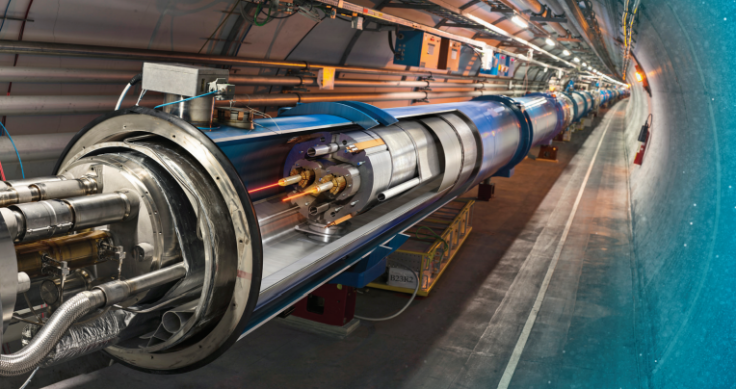CERN Update: Large Hadron Collider Ready For 'Season 2', Experiments To Restart Next Week

The event for which physicists across the world are waiting with bated breath is almost here. CERN’s Large Hadron Collider (LHC) -- the world’s most powerful particle accelerator credited with the discovery of the “God particle” Higgs boson in 2012 -- will be back in action next week, the European research organization said in a statement released Friday.
“During the second run, up to one billion proton collisions could occur every second in the detectors,” CERN said in the statement. Each beam in the collider, traveling close to the speed of light, will carry up to 2,800 “proton bunches,” colliding at a record-breaking energy of 13 teraelectronvolts (TeV).
As CERN explains, the particles are so tiny that the task of making them collide is “akin to firing two needles 10 kilometers [6.2 miles] apart with such precision that they meet halfway.”
This collision would send showers of particles through LHC’s detectors, allowing scientists to discover exotic new particles that could either bolster or “break” the Standard Model of physics.
Given that thousands of magnets of different types and sizes are used to direct proton beams in the accelerator, preparation for LHC’s “Season 2” has been a painstaking process. Following its shutdown two years ago, scientists at CERN have been working strenuously in and around the accelerator’s caverns, recalibrating and improving the sensitivity of its four main detectors located along the 17-mile ring -- ALICE, ATLAS, CMS and LHCb -- and its multitude of subdetectors, magnets, collimators and calorimeters.
“During the long shutdown, all these systems were verified and some were renovated or upgraded,” CERN said in the statement. This renovation will allow LHC’s detectors to collect more data than ever before, giving scientists a better shot at answering some of the most fundamental questions of the universe, including the make-up of the mysterious “dark matter.”
“We know it’s [dark matter] there but have never been able to produce or detect it on earth,” CERN scientists said during an Ask Me Anything session on Reddit earlier this week. “It is rather embarrassing that we only understand 4 percent of our universe at the moment."
In response to a question about the practical importance of the experiments, the scientists pointed out benefits ranging from cancer surgery to the World Wide Web.
“The research we are carrying out at cern may seem far from everyday life today however will bring forward our knowledge of the natural phenomena and it has already practical spin offs. For instance, accelerator technology is used for inoperable cancer surgery, and as you may know, the software protocol that powers the web was invented at cern," they wrote.
© Copyright IBTimes 2024. All rights reserved.





















